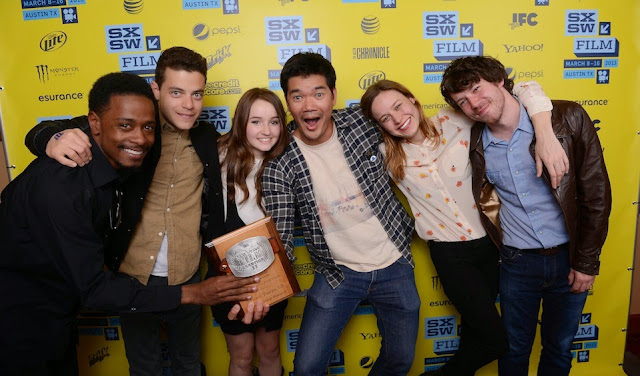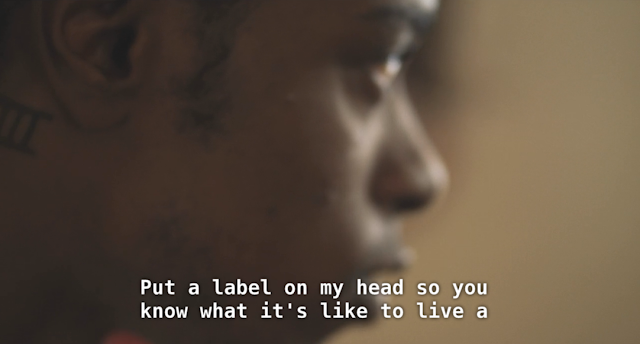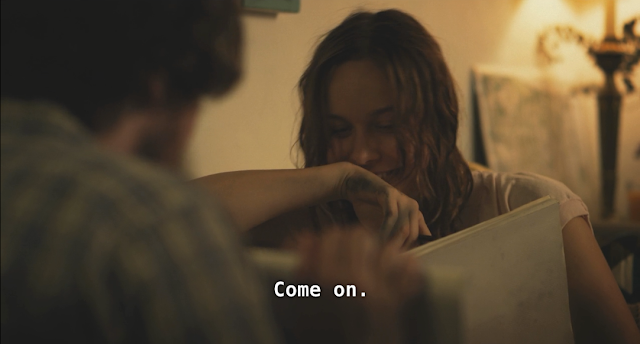Today's edition of Throwback Thursday is a repost of a TBT piece from April 2, 2015.
There was only one word that kept surfacing in the mental notes I took in my head as I was watching Short Term 12 for the third time, in preparation for today's edition of Throwback Thursday, and that word was "economical." Asian American indie filmmaker Destin Cretton's second feature film, the story of a group foster home counselor (Brie Larson) and her determination to save her facility's newest resident (Justified's Kaitlyn Dever) from the same kind of child abuse she herself used to be subjected to, is a triumph of economical storytelling, a film that prefers to show rather than tell, while many other films with similar subject matter opt to smother the audience with dollops of on-the-nose exposition, speechifying and worst of all, mawkishness.
 |
| Destin Cretton (center), the Short Term 12 cast and the film's SXSW Grand Jury Award |
Neither of those three things show up to ruin Short Term 12, which Cretton based on his own 2009 short film of the same name. The only major exposition the audience receives at the start of the film is the terse instructions Larson's character Grace gives to Nate (Rami Malek), the facility's newest staffer, about how to handle the at-risk kids they're assigned to look after ("Remember, you are not their parent, you are not their therapist; you are here to create a safe environment, and that's it"). None of the backstories of the film's four main characters--Grace, her good-humored co-worker and boyfriend Mason (John Gallagher Jr.), Dever's character Jayden and Marcus (Keith Stanfield), a resident with both musical and ichthyological aspirations who's turning 18, so his new age requires him to move out of the short-term home, but he's deeply troubled about having to leave--are unveiled in clumsily written infodumps or pointless flashbacks. They're unveiled gradually, piece by piece, and at believable moments. For example, when Marcus refuses to celebrate his 18th birthday with a party or cake and simply requests to have his head shaven, the film withholds for a while from the audience Marcus' reason for his request. When the film finally makes clear--after the haircut--why Marcus wanted it, it's an unexpected and quietly devastating moment.
Nobody in the film says "My dad's been hitting me" or "I was raised by the system" when they first appear on screen. It just wouldn't ring true. Grace, Jayden and Marcus are survivors of abuse who have difficulties with communication and trusting anyone, so Jayden and Marcus prefer to express the pain they're experiencing through the art they create. In Marcus' case, his art takes the form of a mesmerizing freestyle Cretton shot in one long uninterrupted take.
The believable and stripped-down dialogue is a great example of the verisimilitude Cretton aimed for in Short Term 12 (Cretton himself once worked at a similar facility for at-risk youth, and his experience with social work is evident in moments like Grace's thorough inspection of the kids' rooms for drugs and the scene where Mason and Nate have to carefully restrain Jayden when she has a meltdown in her room). This is the kind of off-kilter film where a character like Mason introduces himself not in a monologue about how his foster family saved him from the streets--that monologue is saved for later, for the most fitting occasion--but in a monologue to Nate about a comedically disastrous workday: the day he shit his pants in front of a kid who tried to run away from both him and Short Term 12, to be exact. It's a brilliant way to establish Mason's compassion and doggedness--a doggedness that surfaces later when he has to deal with Grace's sudden reticence about both being pregnant with his child and accepting his marriage proposal--without lapsing into the standard bad-movie-writing method (ridiculed most memorably by Walk Hard: The Dewey Cox Story) of having Mason declare that "I'm compassionate and dogged."
Grace is equally compassionate and dogged in both her attempts to help the introverted Jayden, who's too scared to report her father's abuse, and her interactions with another similarly introverted charge of hers, Sammy (Alex Calloway), who frequently makes escape attempts that are foiled by Grace, Mason and another counselor, Jessica (a pre-Brooklyn Nine-Nine Stephanie Beatriz, who bizarrely looks and sounds 10 years younger than how she normally looks in her leathery, Emma Peel/Catwoman-esque cop outfits on Nine-Nine). But because Grace didn't grow up with the type of loving and nurturing parents Mason was lucky to have and she still bears emotional and self-inflicted scars from the years of physical and sexual abuse she suffered, social work is more of a challenge for her emotionally and mentally than it is for Mason. Margaret Cho recently said in an interview that the late Robin Williams, one of the kindest comedians she knew in the business, "knew how to give but he had a problem receiving." That perfectly describes Grace.
Jayden's ordeals outside the facility--combined with Grace's fear that the system will fail Jayden, as well as the distressing news that Grace's abusive father is about to be released from prison--reawaken inner demons Grace has fought so hard to suppress. They cause Grace to have doubts about her future with Mason and to shut her fiancé out of the pain she's experiencing and he so desperately wants to help her overcome. Much of the beauty of Larson's excellent performance as Grace is due to her ability to physically express Grace's private worries that she might someday pass on the cycle of abuse to her and Mason's child--without ever verbalizing those worries.
The film's implication that artistic expression has saved and will continue to save these troubled kids' lives--including Grace's--is never spelled out in dialogue either. It's nicely conveyed in only visual terms. Speaking of which, as someone who'd always get huge pencil stains on the sides of the hands while doodling or sketching with pencils, I love how Cretton and cinematographer Brett Pawlak let the audience see the pencil stains on the sides of Grace and Mason's hands while they're relaxing at home by sketching portraits of each other.
Larson's performance is another one of those performances that make you say, "Why, Academy? Why the hell did you sleep on this performance?" The SXSW audience was far more attuned to Short Term 12's stripped-down wondrousness. They awarded Short Term 12 with Audience and Grand Jury prizes in 2013. This gritty but life-affirming film makes me eager to see what else Larson, Dever and Stanfield have up their sleeves acting-wise, as well as any of Cretton's future film work. It's hard to dislike any film where a character names his pet fish after a certain legendary Queensbridge rapper who happens to have a way with telling a story, just like Short Term 12 itself.
None of Joel P West's minimalist score cues from Short Term 12--which, to borrow the words of animator Timothy Reckart regarding Ry Cooder's Paris, Texas score, don't dictate the emotions of the film and instead suggest the depth of those emotions--are currently in rotation on AFOS, but they ought to be.












No comments:
Post a Comment